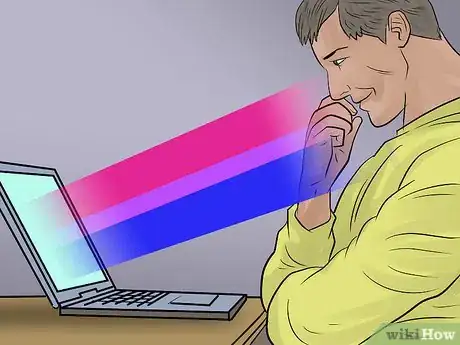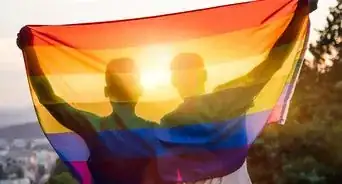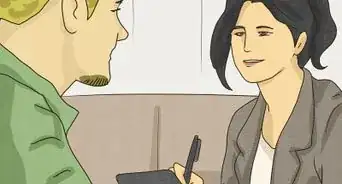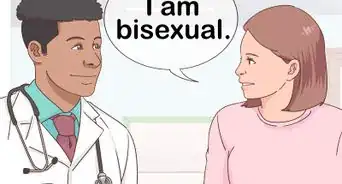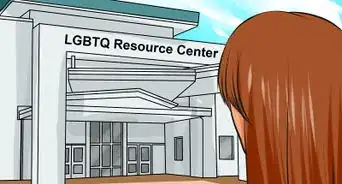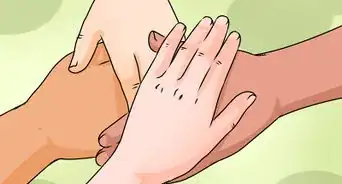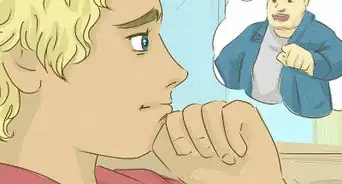This article was co-authored by Deb Schneider, LCSW, PPSC. Deb Schneider is a Licensed Clinical Social Worker in private practice in Oakland, CA, and a Program Manager for the Weiland Health Initiative at Stanford University. With over 15 years of experience, she specializes in creating safe spaces, respectful of marginalized identities, at the high school and college levels. Deb holds a Bachelor’s degree in Sociology and Women's Studies from Clark University and a Master of Social Work (MSW) with Health Concentration from the University of California, Berkeley School of Social Welfare.
wikiHow marks an article as reader-approved once it receives enough positive feedback. This article has 15 testimonials from our readers, earning it our reader-approved status.
This article has been viewed 319,721 times.
Whether you've struggled to solve the mystery of your own sexuality, or you've been told by others it's "just a phase," coming to terms with your bisexuality might present unique and tough challenges. The truth is though, you're perfect just the way you are; and what's more, there are actually tons of effective, psychology-backed tips that can help you feel totally comfortable with your sexuality. And that's exactly how you deserve to feel! Read on for your complete guide below.
Steps
Embracing Your Sexuality
-
1Define your bisexuality on your terms. The word bisexual means different things to different people. In general, it means being attracted to men and women. However, there are varying degrees of bisexuality. If you want to embrace your sexuality, spend some time thinking about what the label means to you.[1]
- Sexuality is fluid and difficult to define. Understand that, when using the word bisexual, it's okay if it means something different to you than other people. You may be interested in both men and women sexually, but only men romantically. You may have always had sexual feelings for men and women, or you may have developed sexual feelings for a particular gender later in life.
- There is no right or wrong way to be bisexual. While there are some people that insist that 50/50 makes someone bisexual, this view does not match up with reality. While some people do experience equal levels of attraction, others do not. If you are bisexual, it's acceptable to define yourself however you want.
- Pay attention to yourself and your own feelings. It's okay if your definition of your bisexuality differs slightly from another person's bisexuality. Everyone is different.
-
2Ignore those who tell you to pick a side. Many people do not understand bisexuality. People may feel you should pick a side instead of dating both men and women. A common criticism bisexual people get is that they're indecisive or greedy. Ignore these criticisms. Remember, many people are attracted to both men and women. You cannot change your sexuality, and so it's impossible for you to simply choose between genders.[2]
- If you feel attraction to both genders, you should not have to choose. Many bisexual people feel torn between the gay and straight community, as they do not feel quite one way or another.
- You don't have to choose between one gender or another, or one community or another. As the LGBT community gets more diverse, you can feel a full part of that even if you still feel sexual and romantic attraction to people of the opposite sex.
- If people tell you to pick sides, try to tune it out. Say something like, "I'm bisexual and attracted to both genders. I don't need to pick a side and it's actually not really possible for me to do that."
Advertisement -
3Remember you do not have to compromise your sexuality. Unfortunately, there is still a stigma surrounding bisexuality. Some people do not believe bisexuality exists. Some people do not want to date bisexual people for fear of infidelity. Never play down or deny your bisexuality for the sake of others. You should not tolerate those who don't accept you for you.[3]
- Never avoid labeling yourself or discussing your feelings of attraction for both men and women. Some people may express confusion, or even make offensive comments. However, it is not your job to make people like you. This is especially true if you have to hide your identity to fit in.
- True friends and allies will support you without question. You get to choose the people you spend time with and should not tolerate friends or romantic partners who do not offer support.
- Remember the world is always changing. Each time you identify as bisexual and refuse to compromise this, you're helping people around you be more aware and accepting.
- Understand that infidelity means being unfaithful to a partner you have agreed to have a committed, monogamous relationship with.
Developing the Right Mindset
-
1Recite a personal mantra. Many people will try to tell you there's something wrong with you. There are people who feel any type of same-sex attraction is wrong. There are also people who feel it's greedy or selfish to pursue men and women. Some people may deny bisexuality exists altogether. Create a mantra for yourself that reminds you that bisexuality is not wrong and it's natural to be attracted to both genders.[4]
- If you feel bad about your sexuality, remind yourself of this. Say something like, "I am bisexual, that is perfectly natural and valid, and there is nothing wrong with me."
- While no one knows precisely why and how sexuality develops, people have little control over feelings of physical and romantic attraction. Your sexuality is who you are. It's never an indication there is something wrong with you.
-
2Know you're not alone. It can sometimes help to remind yourself of how many other people identify the way you do. Coming out can sometimes be a lonely process, especially if a lot of your friends and family members are heterosexual. However, even if it feels like it at times, know that you are not alone in your feelings.[5]
- There are thousands of people who identify as LGBT. A quick internet search for bisexuality is bound to find many resources where people discuss being bisexual and what it means for them. Remember, bisexual is LGBT, as the "B" stands for "bisexual." It may not seem like it just because, say, you're a bisexual female and you are dating a heterosexual male. You are still bisexual, you have not chosen males over females just because of this heterosexual male.
- Never feel like you're the only one who feels this way. Reminding yourself that there are thousands of bisexual people in the world can help you remember it's a valid identity.
-
3Work on liking yourself the way you are. You have a right to feel good about yourself. This can be difficult at times, as there's still a lot of stigma surrounding bisexuality. Try to work on building your self-esteem and embracing yourself for who you are.
- Seek out bi-positive people to talk to. Talk about your sexuality with supportive friends and family members. If there is an LGBT resource center in your community, try seeing if they have bisexual discussion groups.[6]
- Remind yourself that you are okay. People may tell you it's wrong to be bisexual, but let them have their opinions while reminding yourself that you are happy and healthy. Your sexuality does not define your sense of self, self-esteem, or overall happiness.
-
4Accept there is no right way to be bisexual. Many people feel they should act a certain way if they identify as bisexual. You may, for example, feel you should be extra committed to monogamy because of stereotypes about bisexual people being prone to infidelity. However, remind yourself your sexuality is only one component of who you are. There is no right way to be bisexual, because every aspect of your behavior is not related to your sexuality.[7]
- Some people who are bisexual prefer committed relationships. Other are polyamorous or prefer open relationships. Others are still dating around and uninterested in committing to a single person.
- This spectrum of romantic and sexual preferences exists for any sexual orientation. One's feelings about things like fidelity and monogamy are not related to whether they identify as straight, bisexual, gay, lesbian, or any other orientation.
- Pursue whatever types of relationships you want and that will make you happy. If you want a monogamous relationship, be in a monogamous relationship. If you want an open relationship, be in an open relationship. You do not have to follow any rules regarding relationships or dating simply because you are bisexual.
Seeking Support from Others
-
1Open up about being bisexual. Don’t feel pressured to talk about your sexuality, but understand that it can be a positive experience. You don’t need to label yourself if you don’t want to, and you don’t have to choose between your faith and your sexuality. It may be helpful to read about how other people came out to their friends and family. You may also want to open up to one person and tell them you are bisexual. When you feel comfortable with that step, you can move on to telling others.
- Read online forums such as “Empty Closets,” which show how others handle coming out and other issues related to their bisexuality (https://forum.emptyclosets.com/index.php?threads/advice-on-coming-out-to-parents-as-bisexual.259741/).
-
2Talk to others about your sexuality. If you want support, reach out to others. Let them know you're bisexual and explain to them what that means on your terms. Let them know what they can do to support you. Be direct when talking about your sexuality. For example, say something like, "I just wanted you to know I'm bisexual. I've dated men and women. A lot of people assume I'm straight, but I'm not." [8]
- Let the person know what they can do to help. Maybe you just need someone to vent your feelings to someone at times. It can be frustrating to be a part of a marginalized group. Maybe you just want people to watch about the assumptions they make. For example, "If I mention going on a date, I don't want you to assume that it was with a particular gender. It's okay to ask me if I was on a date with a man or a woman."
- You should also let people know if there are some people you don't want to know about your sexuality. It's okay if you don't want to tell everyone you're bi at first. Many people initially come out to a few close friends, so let people know if you're not ready to be out to everyone right now. For example, "Just so you know, I haven't told a lot of people yet. Can we keep this between us for now?"
-
3Share information with friends and family members about your sexuality. Not everyone will understand your sexuality right away. If people are confused or need more information, refer them to a website about bisexuality. You should also let them know they can feel free to ask you any questions they have about your orientation. You should encourage your friends to explore information about the LGBT community so they can better understand your feelings.[9]
-
4Embrace your place in the LGBT community. Many bisexual people feel they don't have a place in the LGBT community, as they don't fit into a single category. However, if you are bisexual, you are on the LGBT spectrum. It's okay to identify as such, and participate in LGBT oriented events. This can help you find support.[10]
- Remember, who you choose to date does not define your sexuality. If you're currently in a relationship with someone of different sex, you do not need to feel alienated from the LGBT community. You're still bisexual, regardless of your current relationships.
- Remember that your identity is valid. Do not feel like you're intruding by becoming involved in the LGBT community in your area.
-
5Learn about other bisexual people. You may feel support knowing there are well-known people who are bisexual. Learning and reading about others can help you normalize your own views about your sexuality. Research celebrities or famous people from the past, such as artists and authors, who were bisexual. This will make you feel your orientation is valid and one that many share.[11]
-
6Attend support groups. Meeting more bisexual people can help you get advice on self-acceptance. Find a local group that is bi-inclusive. Go to conferences that centered bisexuality. Look for support groups online. Reaching out to other bisexual people can help you accept yourself.[12]
- If you're still in high school, see if there's a Gay Straight Alliance at your school.[13]
Expert Q&A
-
QuestionI'm worried about coming out to my grandmother because, while I want her to know, I feel she just doesn't understand these types of things and I'm afraid she will react poorly. What do I do?
 Paul Chernyak, LPCPaul Chernyak is a Licensed Professional Counselor in Chicago. He graduated from the American School of Professional Psychology in 2011.
Paul Chernyak, LPCPaul Chernyak is a Licensed Professional Counselor in Chicago. He graduated from the American School of Professional Psychology in 2011.
Licensed Professional Counselor Try coming out to your parents first, if possible. They can be used as leverage and support for coming out to your grandmother.
Try coming out to your parents first, if possible. They can be used as leverage and support for coming out to your grandmother. -
QuestionI am bisexual, have always known, and I used to date both men and women. I feel insecure and alone because I don't have any friends who are bi. What should I do?
 Paul Chernyak, LPCPaul Chernyak is a Licensed Professional Counselor in Chicago. He graduated from the American School of Professional Psychology in 2011.
Paul Chernyak, LPCPaul Chernyak is a Licensed Professional Counselor in Chicago. He graduated from the American School of Professional Psychology in 2011.
Licensed Professional Counselor Reach out to online forums first to get advice and a sense of connection to others who are bisexual. They can help provide you with further ways to connect with others locally.
Reach out to online forums first to get advice and a sense of connection to others who are bisexual. They can help provide you with further ways to connect with others locally.
References
- ↑ https://bi.org/en/101/bisexuality
- ↑ http://everydayfeminism.com/2015/01/5-ways-to-stand-up-to-toxic-messages-and-accept-yourself-as-a-bisexual-person/
- ↑ http://everydayfeminism.com/2015/01/5-ways-to-stand-up-to-toxic-messages-and-accept-yourself-as-a-bisexual-person/
- ↑ https://www.pflag.org/sites/default/files/Be%20Yourself.pdf
- ↑ https://www.pflag.org/sites/default/files/Be%20Yourself.pdf
- ↑ Deb Schneider, LCSW, PPSC. Licensed Clinical Social Worker. Expert Interview. 2 April 2021.
- ↑ http://everydayfeminism.com/2015/01/5-ways-to-stand-up-to-toxic-messages-and-accept-yourself-as-a-bisexual-person/
- ↑ http://us.reachout.com/facts/factsheet/coming-out-conversation-starters
- ↑ http://us.reachout.com/facts/factsheet/coming-out-conversation-starters
- ↑ http://everydayfeminism.com/2015/01/5-ways-to-stand-up-to-toxic-messages-and-accept-yourself-as-a-bisexual-person/
- ↑ http://everydayfeminism.com/2015/01/5-ways-to-stand-up-to-toxic-messages-and-accept-yourself-as-a-bisexual-person/
- ↑ Deb Schneider, LCSW, PPSC. Licensed Clinical Social Worker. Expert Interview. 2 April 2021.
- ↑ Deb Schneider, LCSW, PPSC. Licensed Clinical Social Worker. Expert Interview. 2 April 2021.
About This Article
It can be difficult to accept your bisexuality because of social pressures, but your sexuality is natural and you can embrace it by being confident and building a support system. Being bisexual means different things to many people, but you should think about how it defines you and understand that there’s no right or wrong way to be bisexual. If someone says you’re indecisive or that you should pick a side, tune them out and tell them that it’s not possible. Remember that each time you identify as bisexual without compromising, you’re helping people around you be more aware and accepting. To feel more accepted, reach out to local LGBT communities or online groups where you can talk about your experience. Consider taking what you learn in these groups and using it to inform your family and friends who might not understand your sexuality. For more help from our co-author, like how to embrace your place in the LGBT community, read on.

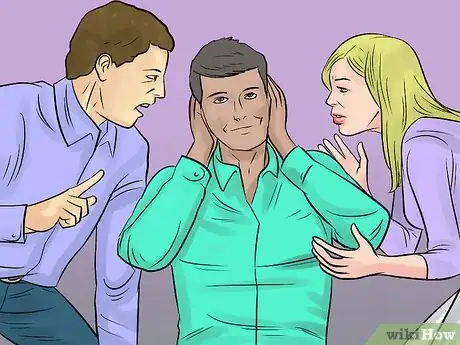


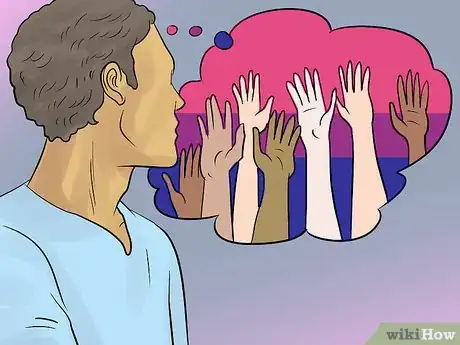



-Step-14.webp)



